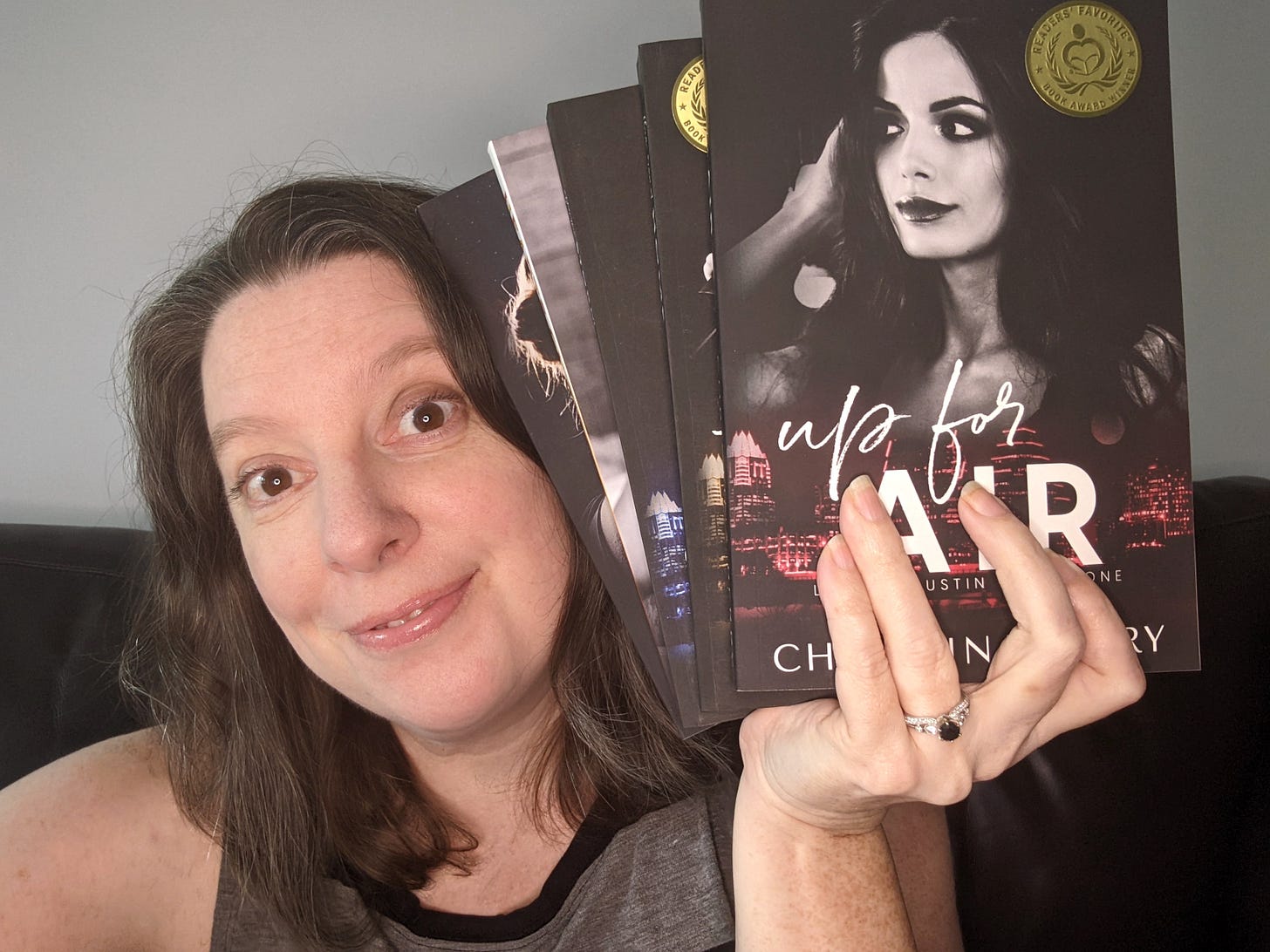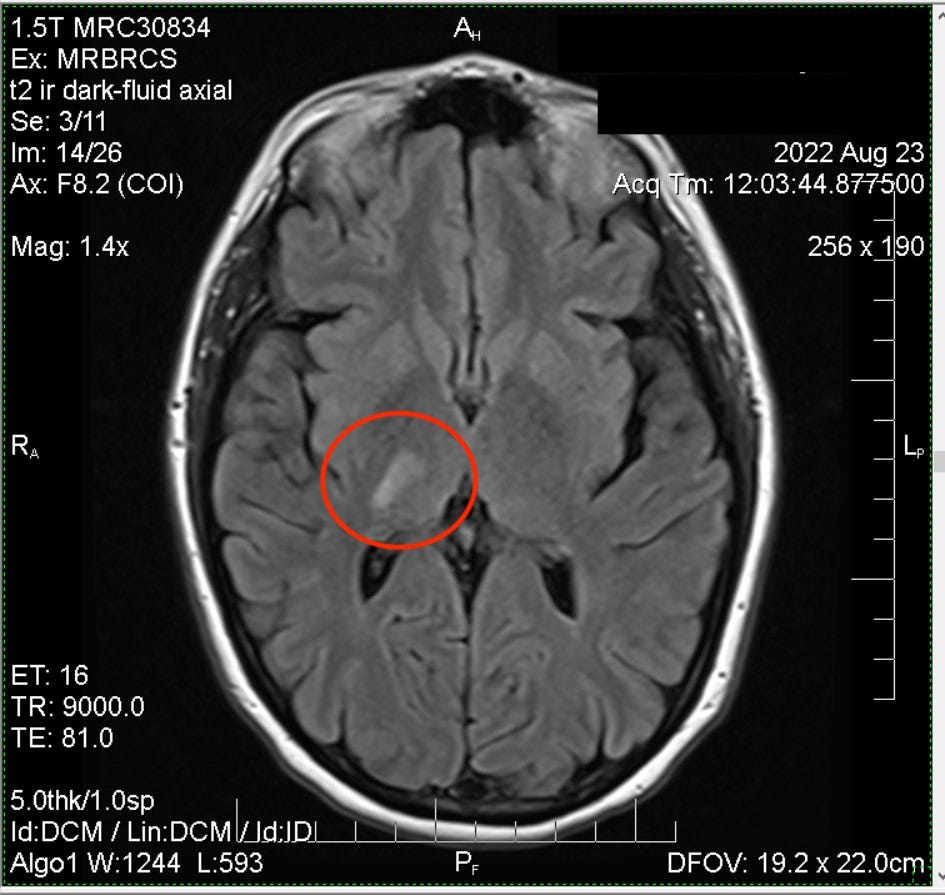The Stroke of a Pen
What happened to a romance novelist in her mid-forties when she couldn't read or write after a stroke
It was August 13, 2022. Early that Saturday morning, after an evening of drinking wine and watching movies, I awoke to use the bathroom. As I sat on the toilet, messing around on my phone, my vision blurred, and I couldn’t read the screen. My left hand stopped working like I expected it to, the tissue paper falling from my grip and rolling across the floor. When I could finally stand, I swayed, my balance off, my feet heavy and clumsy.
Then there was the pain. Like a lightning storm, it flashed from my jaw to behind my eyes to the base of my skull to my temples, thundering through every part of my head.
Something was terribly wrong.
Maybe, I posited to myself, one of the pilot lights on the stove went out, and the house is filling with gas, starving my brain of oxygen, and I’m dying of hypoxia.
Yeah, that was an actual thought I had. I even stumbled out of the bathroom to check that the stove was still functioning properly. Of course, the stove was fine. It was me that was broken.
But how? And why? It wasn’t like I was having a stroke. Right? What an absurd notion. In my mid-forties, I was relatively young, with no family history of strokes, and none of the normal risk factors. Just months earlier I’d had a physical exam, and my ten-year ASCVD risk score (which measures your risk of cardiovascular disease, heart attack, or stroke in the next ten years) was 0.7 percent.
Well, spoiler alert: it was a stroke.
Of course, I didn’t know that at the time. I knew something was wrong, but that annoying little voice in the back of my mind rationalized it. I convinced myself I was overreacting. Literally, I woke my husband because I thought I was dying, then told him, “I feel like I’m dying, so it’s probably just a panic attack.”
Women: Do you do that too? Do you discount your experiences as “probably nothing, I’m overreacting?” Well, stop, because it very well might be something, and in my case, it was a fucking stroke.
I didn’t go to the hospital that night. Instead I talked myself into believing it was the worst migraine of my life, took an Aleve, and lay back down. My sweet husband—who wanted to take me to the hospital, but I convinced him I was fine—brought me a hot pad to put over my eyes so I could try to sleep…while part of my brain died.
That was eight months ago. Eight months filled with doctors’ appointments, tests, and scans to answer two important questions: Why did this happen to me, and how do we stop it from ever happening again?
It didn’t take long for the doctors to determine the cause of my stroke. Turns out, I’ve had a birth defect all my life. Who knew? The fancy name for it is “atrial septal defect,” but I call it the “12mm hole in my heart.” For decades, it went undetected until the night a pesky little blood clot passed through, and all hell broke loose in my brain.
So here I am now: my heart hole is mended, and my brain is finding new neural pathways to connect with the parts of my mind that were lost. It’s all systems go, except for one pesky fly in the ointment: writing.
I’m not writing. Since the stroke, I haven’t written much of anything. And that’s a problem, you see, because I’m a writer.
You might be wondering: “Well, how are you writing this essay? Osmosis?“
Thanks for asking, smartass.
Writing about the stroke is one of the few things that comes naturally to me. The trouble is I’m a steamy romance writer.
I wrote the award-winning emotional rollercoaster Lost in Austin series (Up for Air, The Road Home, and After the Storm), a quirky firefighter cat dad romcom (Hearts on Fire), and a similarly quirky second-chance romcom novella (Wishing Upon a Star). I’ve been writing my ass off for the last few years to release tons of books and build a career and a name for myself.
Then I had this damn stroke, and the only thing I found myself writing about was the stroke, and I wrote about it nonstop. I wanted people to learn from my mistakes, listen to their bodies, and go to the hospital if they faced a medical crisis like mine. So at every turn of this recovery process, I’ve shared the details on my Facebook profile. Recently, I scraped those posts into a word processing file, in case I ever want to turn that content into something else, and discovered I’d written close to 20,000 words!
That’s a lot of words for someone who claims they can’t write, but none of those words were fictional, steamy, or romantic, and therein lies the problem.
When I had the stroke, I was deep in the writing trenches, completing the final edits to After the Storm (book three of the Lost in Austin series, which was scheduled to release two months later) and trying to complete the fourth book of the series, All the Rest, which had an aggressive publication deadline. I wrote 45,000 words in June, 23,000 in July, and I was up to 15,000 words in August when my brain exploded.
I managed to release After the Storm on schedule, on my birthday and coincidentally on the two-month anniversary of the stroke. But book four collects dust now, and that upsets me. I mean, what good is a writer who doesn’t write?
“Why not just sit down and make yourself write?” you might be wondering. “It’s all about discipline.”
True—except one of the lasting effects of the stroke is a frustrating case of ADHD. For months, I’ve struggled to read more than a few pages at a time before my attention wandered off. My writing came in fits and spurts and only with the aid of a speech-to-text app, which would grossly mistranslate my words, creating a semi-recognizable jumble of nonsense.
It’s hard to lose yourself in fiction when you're already lost in reality. So instead of reading and writing, I started playing games on my phone. Puzzles, crosswords, and other brainteasers were a low-attention span way to engage my brain.
Fortunately, my short attention span has stretched longer over time. At about the six-month post-stroke mark, I found I could read whole chapters and remember most of what I’d read. I could set and reach goals, like: read the next 10 percent of this book before playing crossword puzzles. And I would. I started finishing books, and then I started finishing more. To date, I'm not quite back to my two-a-week reading habit, but I’ll get there.
Around the same time, I started to think more about my writing problem too. Maybe the reason I could only write about the stroke was because the stroke was the story I needed to tell.
That’s when it hit me, my stroke of genius: I would write the stroke into my fiction!
Say hello to my new project: Hearts to Mend will be a sequel to my firefighter cat dad romcom, Hearts on Fire. Set in the same small Texas town and with many of the same characters as Hearts on Fire, this story revolves around Rico, a single dad, and Dee, a female firefighter. They were high-school sweethearts, and they could have a second chance at love if they would just forgive each other for the pain caused by a nasty breakup. But just as they’re making their way back to friendship and possibly more, Rico has a stroke. Dee’s paramedic training combined with her tendency to be a caregiver kick in, giving them lots of time to reconnect and mend what’s broken between them.
It’s a bit on the nose, I know, but you work with what you got. And who better to write a love story about stroke recovery than a writer in the midst of stroke recovery, right?
Maybe, just maybe, I’ll cure my writer’s block with the stroke of a pen.
Watch our interview with Christina Berry on her stroke recovery.






I’m confused right now. Do I know you?
I’m going through a rough patch right now.
First, I’m not sure what to do at this point.
I’m really scared and I don’t know about the advice given has even helped me.
Uh-oh! 💡Thank goodness for this day and for your support.